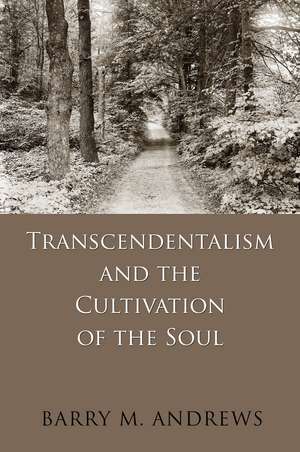Transcendentalism and the Cultivation of the Soul
Autor Barry M. Andrewsen Limba Engleză Paperback – 18 oct 2017
American Transcendentalism is often seen as a literary movement—a flowering of works written by New England intellectuals who retreated from society and lived in nature. In Transcendentalism and the Cultivation of the Soul, Barry M. Andrews focuses on a neglected aspect of this well-known group, showing how American Transcendentalists developed rich spiritual practices to nurture their souls and discover the divine. The practices are common and simple—among them, keeping journals, contemplation, walking, reading, simple living, and conversation. In approachable and accessible prose, Andrews demonstrates how Transcendentalism's main thinkers, Emerson, Thoreau, Fuller, and others, pursued rich and rewarding spiritual lives that inspired them to fight for abolition, women's rights, and education reform. In detailing these everyday acts, Andrews uncovers a wealth of spiritual practices that could be particularly valuable today, to spiritual seekers and religious liberals.
Preț: 222.26 lei
Nou
Puncte Express: 333
Preț estimativ în valută:
42.54€ • 44.24$ • 35.11£
42.54€ • 44.24$ • 35.11£
Carte disponibilă
Livrare economică 25 martie-08 aprilie
Preluare comenzi: 021 569.72.76
Specificații
ISBN-13: 9781625342935
ISBN-10: 1625342934
Pagini: 188
Dimensiuni: 152 x 229 x 16 mm
Greutate: 0.29 kg
Ediția:First Edition
Editura: University of Massachusetts Press
Colecția University of Massachusetts Press
ISBN-10: 1625342934
Pagini: 188
Dimensiuni: 152 x 229 x 16 mm
Greutate: 0.29 kg
Ediția:First Edition
Editura: University of Massachusetts Press
Colecția University of Massachusetts Press
Notă biografică
Barry M. Andrews, a retired minister, is author of several books, including Thoreau as Spiritual Guide: A Companion to Walden for Personal Reflection and Group Discussion.
Recenzii
"In this outstanding book, Barry Andrews explores the concrete, interrelated spiritual practices that were the vital source from which everything else about Transcendentalism—texts, ideas, and social action—flowed. These practices are eminently available to spiritual seekers today, both those who are connected to conventional forms of religiosity and those who are allergic to 'religion.'—Dan McKanan, author of Prophetic Encounters: Religion and the American Radical Tradition
"Seeing oneself clearly is at the heart of living consciously, and Transcendentalism and the Cultivation of the Soul by Barry M. Andrews (Univ. of Massachusetts, Oct.) focuses on the consciousness-enhancing practices developed by the American Transcendentalists, including simple living, journaling, contemplation, walking in nature, reading, and conversation."—Publishers Weekly
"Drawing from classic works, as well as from modern and post-modern authors, Andrews makes a strong case that the Transcendentalist call to a meaningful life continues to be of consequence today . . . this book stands as both a history and a practical guide toward spiritual growth."—Journal of Unitarian Universalist History
"As informed and informative as it is thoughtful and thought-provoking, Transcendentalism and the Cultivation of the Soul is an extraordinarily well researched, written, organized and presented study, making it an especially and unreservedly recommended addition to both community and academic library collections."—Midwest Book Review
"[T]he purpose of the book is not so much an intervention in literary history and criticism, but an attempt to 'reclaim and interpret [Transcendentalists] for contemporary audiences' . . . If there are indeed religious liberals and spiritual seekers looking for a rich tradition to inspire deeper connections to nature and enduring convictions about social reforms, then Andrews provides a useful guide on how to re-dig those wells of revival."—Emerson Society Papers
"This project, like [Andrews'] earlier ones, rests on extensive research and a life-long study of the Transcendentalists and their religious and cultural milieu. His scholarly apparatus is sound (if somewhat understated), reliable, and up to date, and it reflects an awareness of many relevant critical contributions to modern Transcendentalism scholarship."—Thoreau Society Bulletin
"Seeing oneself clearly is at the heart of living consciously, and Transcendentalism and the Cultivation of the Soul by Barry M. Andrews (Univ. of Massachusetts, Oct.) focuses on the consciousness-enhancing practices developed by the American Transcendentalists, including simple living, journaling, contemplation, walking in nature, reading, and conversation."—Publishers Weekly
"Drawing from classic works, as well as from modern and post-modern authors, Andrews makes a strong case that the Transcendentalist call to a meaningful life continues to be of consequence today . . . this book stands as both a history and a practical guide toward spiritual growth."—Journal of Unitarian Universalist History
"As informed and informative as it is thoughtful and thought-provoking, Transcendentalism and the Cultivation of the Soul is an extraordinarily well researched, written, organized and presented study, making it an especially and unreservedly recommended addition to both community and academic library collections."—Midwest Book Review
"[T]he purpose of the book is not so much an intervention in literary history and criticism, but an attempt to 'reclaim and interpret [Transcendentalists] for contemporary audiences' . . . If there are indeed religious liberals and spiritual seekers looking for a rich tradition to inspire deeper connections to nature and enduring convictions about social reforms, then Andrews provides a useful guide on how to re-dig those wells of revival."—Emerson Society Papers
"This project, like [Andrews'] earlier ones, rests on extensive research and a life-long study of the Transcendentalists and their religious and cultural milieu. His scholarly apparatus is sound (if somewhat understated), reliable, and up to date, and it reflects an awareness of many relevant critical contributions to modern Transcendentalism scholarship."—Thoreau Society Bulletin
